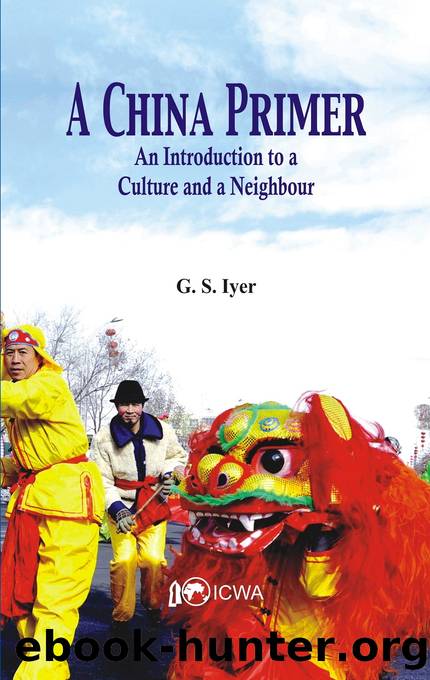A China Primer: An Introduction to a Culture and a Neighbour by G S Iyer

Author:G S Iyer [Iyer, G S]
Language: eng
Format: epub
Tags: International Relations, History & Theory, Political Science, American Government, Geopolitics, General
ISBN: 9789385563256
Google: FVfYCwAAQBAJ
Publisher: Vij Books India Pvt Ltd
Published: 2016-05-25T07:03:52+00:00
Workers No Longer the Leading Class
What happened to industries was something parallel to the effect reform produced in villages. By 1956, China had completed the nationalisation of its economy and contractual labour disappeared as a result. The Chinese Constitution declared workers to be the leading class, making them âmasters of their production unitâ. In practical terms, their wages were unilaterally set by the state with no opportunity for collective bargaining. The government also withheld approximately half their earnings for investment. This forced deprivation was partly compensated by the prestige workers enjoyed as the leading revolutionary class and, in more practical terms, by the offer of non-cash benefits like food, clothing, housing etc. at subsidised rates with lifetime guarantees and other welfare measures covering birth, education and healthcare for their families and even funeral arrangements. The social scientist Wen Tiejun summarised this arrangement as the appropriation of the bulk of the surplus produced by the workers at very low cost in return for a guarantee of lifelong security and promise of a better future, popularly known in China as the âiron rice bowl, which would always be there and cannot be broken.
What happened in the â80s was a comprehensive violation of this solemn compact with the people. Quoting Wen Tiejunâs observation cited above, Wang Yi of Chengdu University concluded, âStarting from the mid-80s when a full fledged labour contract reform was launched .... A process of betrayal set in. The obligation of the government under the previous system was never converted into any form of contractual labour relations. The state had no intention of reflecting in cash terms its own obligations. On the contrary, it has continuously sought to evade under the cover of âlegalisationâ the historical responsibility voluntarily assumed on the very first day the Chinese Communist Party raised its revolutionary banner.â20 Thus was the âiron rice bowlâ broken as a result of the much extolled liberalisation. An illustration of this process can be seen from the way workersâ housing was dealt with. When state owned firms were asked to raise their own funds, they cancelled the housing arrangements, in effect expropriating what the workers had acquired through their labour as return for the savings they had made for investment and national development. They had to save all over again to buy the housing which, in fairness, was their right from the beginning. Even this was not the end. City Administrations routinely ordered people out and took over properties in attractive locations for redevelopment and pushed the owners to more distant suburbs. Compensation was inadequate; there were no means of public agitation or legal redress. In most cases, the land taken over thus was sold to developers in sweetheart deals without auction or any similar transparent procedure. Most of the millionaires in China amassed their wealth through such arrangements with the ruling party.
Download
This site does not store any files on its server. We only index and link to content provided by other sites. Please contact the content providers to delete copyright contents if any and email us, we'll remove relevant links or contents immediately.
| Anthropology | Archaeology |
| Philosophy | Politics & Government |
| Social Sciences | Sociology |
| Women's Studies |
The Secret History by Donna Tartt(19052)
The Social Justice Warrior Handbook by Lisa De Pasquale(12187)
Thirteen Reasons Why by Jay Asher(8893)
This Is How You Lose Her by Junot Diaz(6877)
Weapons of Math Destruction by Cathy O'Neil(6264)
Zero to One by Peter Thiel(5786)
Beartown by Fredrik Backman(5737)
The Myth of the Strong Leader by Archie Brown(5499)
The Fire Next Time by James Baldwin(5431)
How Democracies Die by Steven Levitsky & Daniel Ziblatt(5215)
Promise Me, Dad by Joe Biden(5141)
Stone's Rules by Roger Stone(5081)
A Higher Loyalty: Truth, Lies, and Leadership by James Comey(4954)
100 Deadly Skills by Clint Emerson(4921)
Rise and Kill First by Ronen Bergman(4779)
Secrecy World by Jake Bernstein(4741)
The David Icke Guide to the Global Conspiracy (and how to end it) by David Icke(4706)
The Farm by Tom Rob Smith(4502)
The Doomsday Machine by Daniel Ellsberg(4484)
